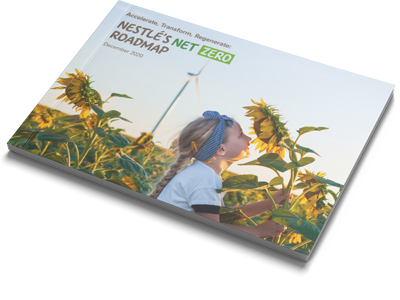Tackling climate change can’t wait and neither can we.
Nestlé is using its size, scale and reach to tackle climate change and make a big difference. We are transforming our business and using our resources to inspire change.
Building on a decade of action, we will halve our greenhouse gas emissions by 2030 and reach net zero by 2050 - even as our business continues to grow.
We are playing a leading role by tackling emissions across our business and supply chain. We are supporting farmers and suppliers to advance regenerative agriculture, planting 20 million trees every year for the next 10 years and completing our transition to 100% renewable electricity globally by 2025. Additionally, we are increasing the number of ‘carbon neutral’ brands.
Our path to net zero addresses three main areas
We work closely with farmers, suppliers and communities where we operate to source our ingredients in a way that generates positive environmental and social impacts.
- Working with farmers to adopt practices that tackle climate change and enhance livelihoods
- Motivating our suppliers around the world to join us on our journey to net zero.
- Planting 20 million trees every year for the next 10 years.
- Ensuring our suppliers of key commodities are completely deforestation-free by 2022
Achieving net zero emissions will involve big changes to the way we make our products.
- Moving to 100% renewable electricity for all 800 sites globally, which we have already achieved in the UK & Ireland.
- Switching global fleet of owned or contracted vehicles to lower emission options by 2022 and to offset any reminding emissions.
Using our know-how and resources, we will transform our portfolio with products that are ‘good for you and good for the planet’.
- Lowering the impact of our recipes
- Improving how we measure and manage emissions
- Moving towards carbon neutral brands
Nestlé UK and Ireland has been working to reduce operational greenhouse gas emissions for over a decade and we have achieved a 61% reduction per tonne of product since 2007 as a result of a combination of energy efficiency improvements and the transition to renewable energy.
In 2016, all of our factories and offices in the UK and Ireland transitioned to 100% renewable grid-supplied electricity by investing in the development of new wind power capacity. We have also invested in renewable technologies to generate our own green energy, such as solar panels, hydropower, anaerobic digestion and biomass.









